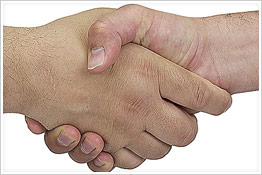Defusing Anger
By Lee Hollister, high school student and Marjorie Foerster Eddington
Question
How do you deal with anger? Should you forgive and forget?
Answer
 Nothing good has ever come from anger or hatred. I've noticed anger a lot in the teenager society -- and in society in general. Whether it's focused at parents or friends (or "enemies"), anger is never good. Nothing good has ever come from anger or hatred. I've noticed anger a lot in the teenager society -- and in society in general. Whether it's focused at parents or friends (or "enemies"), anger is never good.
The best positive step to get rid of anger is to forgive, of course. Forgiveness puts aside differences. Sometimes forgiveness enables you to become friends again, and you can laugh at what stupid things you fought over. You can be on equal terms again.1
The Bible has many lessons that show the importance and the blessings of forgiveness. The best example that I can think of is Jesus' parable of the Prodigal Son in Luke 15:11-32. It starts with the youngest son asking for his inheritance from his father, which the father gives him. The son spends all of this money on "riotous living" (15:13). He flitters all of the money away until there's a "famine in that land" (15:14). The son is forced to work as a farm-hand and feed pigs. He finally comes to his senses and decides to present himself in front of his father with shame and humility.
His father, instead of being furious with his son, embraces him. The father automatically forgives all that his son has done. He's just glad to see that his son is alive and well. They celebrate and have a good time together. This is the perfect model of forgiveness.2
Holding a grudge for years on end won't help anything. It's not very healthy to have a mental disposition like that anyway. When you forgive and forget, it benefits your life in the long run. The main point is that if you break down those walls of hatred, you can find and feel the warmth and friendliness that come from forgiveness.
Lee Hollister, high school student
Editor's Notes
1Forgiving someone does not always mean that you become friends again. Sometimes things happen that make mending relationships virtually impossible. But that doesn't mean that you refuse to forgive. In fact, forgiving someone who does the unforgivable is not just for the other person; it's one of the best things you can do for yourself. If you don't forgive, the anger and resentment you feel toward that person builds up and has a negative impact on your own life. You end up giving the person power to make you angry, resentful, even hateful. If you forgive, you let go of that anger and hatred and are free of it. You are in control of your own feelings.
2The father would easily be justified in being angry at his son. The son has asked his dad for his inheritance, something that wouldn't normally come to him until the dad passes on. So the son is truly insulting his dad, almost saying that he wished he were dead. And then he goes and spends all the money. Rather than being angry and resentful, the father is forgiving, welcoming, and gentle. It is the father's forgiveness and love, not anger, that heal the situation and promote the complete transformation of his son. |

